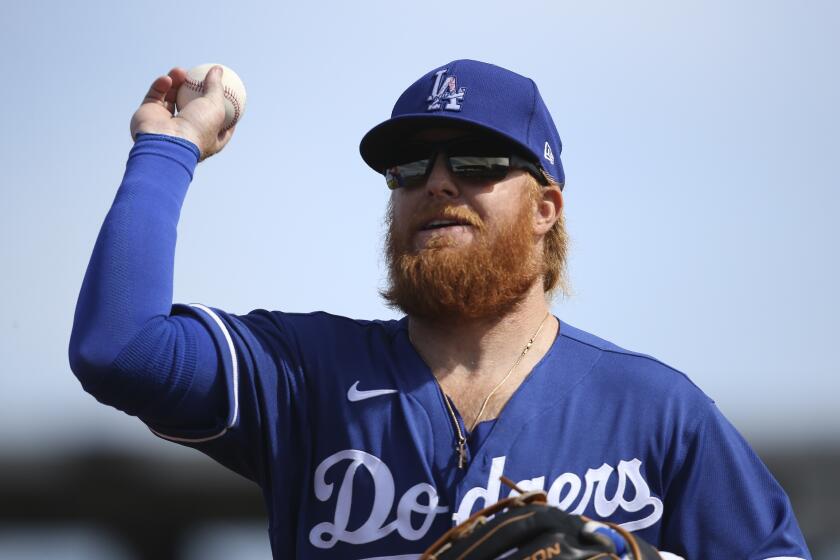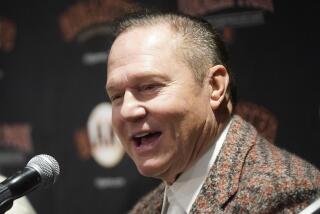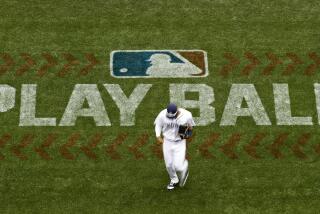‘Like a paid therapist’: Baseball agents’ role broadens during time of uncertainty
- Share via
Sixty-seven pages of safety protocols sat on a desk in Andy Mota’s South Florida home a week ago. The document, crafted by Major League Baseball to explain in extreme detail how the league can avoid the spread of the novel coronavirus during a potential abbreviated season, required careful reading.
Yet Mota couldn’t help letting his mind wander, thinking about players in distress. In addition to his major league clientele, he manages 25 minor leaguers, a group coming to grips with the likelihood its 2020 season will not be staged.
One of his clients, a 20-year-old who signed as an international free agent for more than $600,000 about three years ago, recently concluded he would need to sell the home he purchased for his mother in the Dominican Republic. The weekly $400 check MLB has sent to minor league players since April 8 will cease May 31. He has not been paid regular wages since last season ended in early September. If he doesn’t play this summer, he will not receive a salary again until next April.
The player, who Mota declined to identify out of respect for the delicate nature of the situation, told his agent, “I don’t even know how I’m going to eat.”
The MLB draft will be just five rounds and held virtually. Undrafted players can’t sign for more than $20,000, meaning many likely won’t turn pro for now.
“It’s heartbreaking to have to tell the minor league players they might not play in 2020,” said Mota, a senior vice president of baseball at Wasserman and the son of former Dodgers player and coach Manny Mota. “Imagine a Dominican kid. This is his job, to play for five months and make $1,500 a month [in season]. That’s his income for the year.”
Three months ago, Mota and other agents were prepping their major league clients for arbitration hearings. They were traveling from Florida to Arizona, bouncing around spring training sites, to spend time with minor and major leaguers about to embark on a new season.
Now?
“I’m kind of like a paid therapist,” said Ryan Hamill, a player representative for Creative Artists Agency.
Hamill has spent his 15 years as an agent talking players off all sorts of emotional ledges. So have his counterparts at other firms.
The coronavirus pandemic complicated that duty. It spawned a set of concerns that encompasses more than a player’s career arc.
The most contentious issues — deciding where to play, receiving fair compensation and ensuring the league can prevent a coronavirus outbreak if a partial season is negotiated — have been deliberated in public. Fear of becoming infected with the virus has tinged the conversations.
“They want to play the game,” said Danny Horwits, a baseball agent for 32 years. “They love the game. It’s their livelihood, the way they earn their money. So they obviously want to go out and play. But at the same time, they want to make sure they’re healthy, their families are healthy. And they want to make sure they’re able to see their families and their children and their wives.”
“These dreams are being crushed because of things they have no control over. That’s really the most difficult thing to have to explain to somebody, that he didn’t do anything wrong.”
— Ryan Hamill, a player representative for Creative Artists Agency
Keeping clients informed is key. Squelching social media misinformation is often necessary. In early May, a rumor spread across Twitter alleging the minor league season had officially been canceled. Horwits, who is president of the Beverly Hills Sports Council, had informed his clients a day earlier that no one had yet called off the season. The assurances didn’t stem the tide of questions.
“There were families and players reaching out to make sure, is there something different than what we heard yesterday?” Horwits said.
MLB had already moved to eliminate 42 minor league teams in 2021, which would cut some 1,000 players. Those vying for the remaining roster spots — and the accompanying salaries that are expected to range, at minimum, from $400 per week in rookie and short-season leagues to $700 per week in triple A — are not only worried about missing their paychecks this summer. They’re worried about never playing professional baseball again.
“These dreams are being crushed because of things they have no control over,” Hamill said. “That’s really the most difficult thing to have to explain to somebody, that he didn’t do anything wrong. There’s nothing [he] did and there’s nothing [he] could have done.”
It’s no less difficult for players trying to break into the sport. In response to the pandemic, MLB’s annual draft of amateur players was shortened to five rounds from its usual 40 and a $20,000 limit was placed on the bonuses teams can offer undrafted free agents. The decision has jeopardized hundreds of career paths. Agents had to adjust in kind — from advising draft prospects on how to stay in shape for a potential minor league debut to helping them decide if staying in school would increase the likelihood of a large payout in the future.
“That’s the stuff we’re dealing with,” Mota said. “Keeping our guys informed, No. 1, , and trying to encourage them to stay positive.”
Agents have essentially taken on the role of administrative assistants, parsing out to their clients information gathered from various experts, including health officials. Scott Boras has set up video conferences between Mayo Clinic employees and his clients.
Boras, perhaps the most prominent baseball agent, has also publicly advocated for players. His Twitter feed boasts a long list of his radio appearances. He tells team owners what he thinks they should do in each public address.
How can Dodgers fans find an outlet for their frustration of the cheating Astros? The St. Paul Saints are here to help with unique bobblehead.
He proposed extending the playoffs into December. In April, he suggested calling players to spring training sites in waves before states began to reopen. Boras said everyone would practice “functional isolation” and the control groups into which they were sorted would protect players from interacting with anyone who had been infected with coronavirus. In a May 5 op-ed for the New York Times, he wrote that baseball needs to return to help the country heal.
Even without wading into the public forum, however, baseball agents have had no issue staying active.
It just may not be obvious. Hamill’s young daughter, thrown off by her dad’s persistent presence this spring, wondered if he no longer had baseball friends to keep him away from their Hermosa Beach home.
“Baseball friends” have kept Hamill quite busy. One of his clients, Anaheim native Michael Lorenzen of the Cincinnati Reds, started a home workout video series called “Zen Den” on Instagram. Another client, Lucas Giolito of the Chicago White Sox, spent weeks participating in MLB’s virtual video game tournament before losing in the finals.
Serious matters have taken up much more of Hamill’s time. He spent some 12 hours fielding calls last Monday, when members of the MLB Players Assn. held a 3½-hour video conference call to go over the league’s 67-page health and safety proposal.
“When those guys are on the field, they’re not calling me,” Hamill said. “They might text me when they come out of the game after either a bad or good outing, from the clubhouse, but they’re not calling me all day long saying, ‘Hey, what’s going on with the new proposal by the MLB? What’s going on with the MLBPA?’”
More to Read
Go beyond the scoreboard
Get the latest on L.A.'s teams in the daily Sports Report newsletter.
You may occasionally receive promotional content from the Los Angeles Times.












